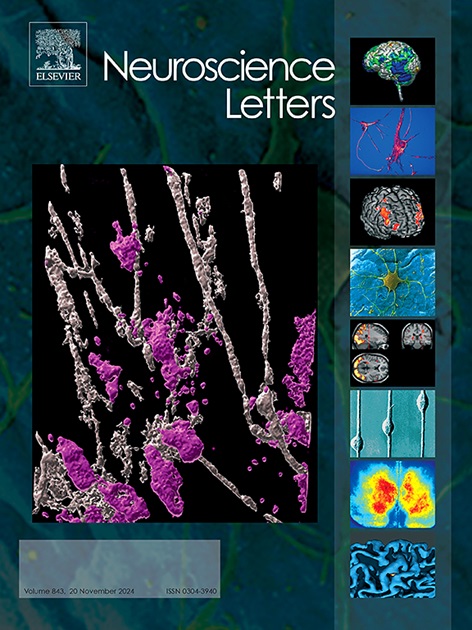高直链淀粉饮食改善lps诱导的认知障碍和抑郁样表型。
IF 2
4区 医学
Q3 NEUROSCIENCES
引用次数: 0
摘要
神经炎症伴随着胶质细胞的激活,如小胶质细胞和星形胶质细胞。这些神经胶质细胞释放的细胞因子影响神经元,导致其功能障碍,最终导致细胞死亡。神经炎症已被认为会导致认知功能下降以及精神疾病,如重度抑郁症(MDD)。近年来,从肠-脑轴的角度来看,益生元方法被认为可以改善神经炎症。据报道,摄入抗性淀粉会增加产生短链脂肪酸(SCFA)的细菌的数量,而SCFA可能通过人类和啮齿动物的肠脑关系抑制神经炎症。据报道,富含直链淀粉(一种抗性淀粉)的饮食会导致小鼠粪便中短链脂肪酸水平的增加。基于这些发现,我们假设高直链淀粉饮食可以改善认知障碍和由神经炎症驱动的抑郁样行为。在本研究中,我们采用脂多糖(LPS)诱导小鼠神经炎症。恐惧条件反射试验表明,这种益生元方法抑制了LPS引起的联想学习能力下降。此外,悬尾和强迫游泳试验表明,这种益生元方法对lps诱导的抑郁样行为有改善作用。这些结果表明,抗性淀粉具有益生元效应,可以改善由LPS引起的认知功能下降和抑郁样症状。本文章由计算机程序翻译,如有差异,请以英文原文为准。

High-amylose diet ameliorates LPS-induced cognitive impairment and depression-like phenotype
Neuroinflammation is accompanied by the activation of glial cells, such as microglia and astrocytes. The cytokines released by these glial cells affect neurons, causing their dysfunction and eventually leading to cell death. Neuroinflammation has been suggested to cause cognitive function decline as well as psychiatric disorders, such as major depressive disorders (MDD). In recent years, from the perspective of the gut-brain axis, a prebiotic approach has been considered to improve neuroinflammation. The ingestion of resistant starch has been reported to increase the number of short-chain fatty acid (SCFA)-producing bacteria, and SCFA may suppress neuroinflammation through the gut-brain relationship in both humans and rodents.
It is reported that diets rich in amylose, a type of resistant starch, lead to an increase in SCFA levels in the feces of mice. Based on these findings, we hypothesized that a high-amylose diet can ameliorate cognitive impairment and depression-like behaviors driven by neuroinflammation. In the present study, we employed lipopolysaccharides (LPS) to induce neuroinflammation in mice. A fear conditioning test showed that this prebiotic method suppressed the decline of associative learning caused by LPS. In addition, tail suspension and forced swim tests showed the ameliorating effect of this prebiotic method on LPS-induced depression-like behaviors. These results suggest that resistant starch has a prebiotic effect, improving cognitive function decline and depression-like symptoms caused by LPS.
求助全文
通过发布文献求助,成功后即可免费获取论文全文。
去求助
来源期刊

Neuroscience Letters
医学-神经科学
CiteScore
5.20
自引率
0.00%
发文量
408
审稿时长
50 days
期刊介绍:
Neuroscience Letters is devoted to the rapid publication of short, high-quality papers of interest to the broad community of neuroscientists. Only papers which will make a significant addition to the literature in the field will be published. Papers in all areas of neuroscience - molecular, cellular, developmental, systems, behavioral and cognitive, as well as computational - will be considered for publication. Submission of laboratory investigations that shed light on disease mechanisms is encouraged. Special Issues, edited by Guest Editors to cover new and rapidly-moving areas, will include invited mini-reviews. Occasional mini-reviews in especially timely areas will be considered for publication, without invitation, outside of Special Issues; these un-solicited mini-reviews can be submitted without invitation but must be of very high quality. Clinical studies will also be published if they provide new information about organization or actions of the nervous system, or provide new insights into the neurobiology of disease. NSL does not publish case reports.
 求助内容:
求助内容: 应助结果提醒方式:
应助结果提醒方式:


